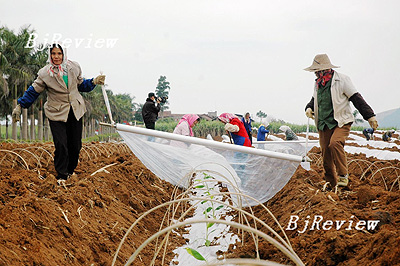|

"We have formed plans earlier than ever before regarding vegetable production of this spring and summer," said Wang Shoucong, Deputy Director of the Crop Production Bureau under the Ministry of Agriculture.
"Dedicated efforts will also be made to rehabilitate agricultural production hurt by the recent snow disaster," said Wang. "Meanwhile, we have already started preparations for spring farming this year. The Ministry of Agriculture will wage a nationwide ‘Year of Grain High Yield' campaign this year, making it the start of a succession of high grain yields."
The Ministry of Agriculture is just one of the central government departments already preparing for spring planting. Seldom before have government departments made such efforts prior to the Chinese lunar New Year. These early moves are intended to recover from losses arising from the recent snowstorms in many parts of the country. Another reason is to ease inflationary pressure by stabilizing grain yield in 2008.
The State Council recently released the Advice of the Central Committee of the Communist Party of China and the State Council on Improving Rural Infrastructure Construction and Promoting Further Development of Agriculture and Income Growth of Farmers, or the No. 1 Document of 2008. Accordingly, a set of policies will be geared toward agricultural production to ensure the supply of farm produce and address issues concerning agriculture, farmers and rural areas.
Stabilizing fertilizer prices
As the National Development and Reform Commission (NDRC) stipulated on January 22, the ex-factory price of urea fertilizers overseen by the Central Government will be frozen during the preparatory period for spring farming. The ex-factory prices of locally managed urea, phosphate and compound fertilizers will also be kept in check. Besides these measures, price increases of other fertilizers will be subjected to record filing and approval, and fertilizer enterprises will further enjoy favorably priced supplies of electricity, natural gas and transport services offered by the state.
NDRC regulations even capped the difference rate of ex-factory and retail prices of fertilizers under 7 percent.
In another move, the NDRC has pledged a special investigation on fertilizer prices during the preparatory period for spring farming, especially the ex-factory prices of fertilizer producers.
According to Cao Changqing, Director of the Department of Price under the NDRC, relevant price departments will intensify their supervision and prompt the materialization of favorable measures. Violations of electricity, natural gas and transport service suppliers against these favorable policies will be resolutely rectified and dealt with. This also applies to fertilizer producers using other products than the favorably priced electricity and natural gas.
"The NDRC will directly undertake investigations on some large fertilizer producers," said Cao. "Those with records of breaking the ex-factory price ceiling are the key objectives. Once confirmed, they will face severe punishments. Typically bad cases with serious consequences will be exposed to the public.
"All these efforts aim to stabilize fertilizer prices and ensure fertilizer supply for the upcoming spring farming."
Standardizing seeds
On January 25, the Ministry of Agriculture kick-started the crop variety withdrawal mechanism under state examination in an effort to standardize the seed market. Deprived of value, 210 defective crop varieties have been forced to quit the market. The Ministry of Agriculture has even ordered a ban on seed production of the withdrawn varieties.
By the end of last year, 2,297 crop varieties had undergone the examination and approval of the state. "Improved varieties contribute nearly 40 percent to the grain yield increase," said Ma Shuping, Deputy Director with the Crop Production Bureau under the Ministry of Agriculture. "Abolishment of the 210 old varieties has little bearing on the plant production in the future.
"The variety management is instrumental in helping fulfill the 2008 yield target of outnumbering that of 2007, set by the Ministry of Agriculture," Ma pointed out. China's total grain yield in 2007 was 501.5 billion kg, a rise of 3.5 billion kg over 2006.
The Ministry of Agriculture has adopted a more stringent standard in managing the seeds, featuring the standard update of seed variety examinations and supervision over the quality of seeds in the market.
"We have entrusted 12 seed examination institutions to conduct sample investigations on 212 varieties and will release the results to the public before the spring farming," said Ma. "Unqualified varieties will be barred from entering the market.
| 